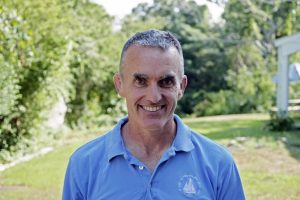AGU Honors Christopher Reddy with 2018 Ambassador Award
– SEPTEMBER 13, 2018
The Gulf of Mexico Research Initiative congratulates Dr. Christopher “Chris” Reddy for being honored with the 2018 American Geophysical Union’s Ambassador Award. This award honors members whose achievements extend beyond those recognized by traditional scientific discipline, recognizing scientists who have made outstanding contributions that inform society about Earth and space science and who provide leadership in science collaboration and innovation and help build a global talent pool. The award will be conferred at the fall AGU Meeting in Washington, DC in December 2018.
Christopher Reddy is a Senior Scientist in the Department of Marine Chemistry and Geochemistry at Woods Hole Oceanographic Institution. His principal research interests have been marine pollution, the development of safer, more environmentally friendly industrial chemicals, and communicating science and how science works to non-scientists. He currently dedicates most of his time to research about the Deepwater Horizon oil spill, oil leaking at the USS Arizona in Pearl Harbor, and plastic pollution.
Reddy has published over 175 peer-reviewed manuscripts, more than 350 scientific presentation, and 72 non-peer-reviewed writings (commentaries, letters, reviews, essays, editorials). He has participated in 12 ocean expeditions, been awarded seven U.S. patents, served as a faculty advisor or co-advisor to six graduate students and 10 post-doctoral investigators, hosted over 40 summer student interns, and given numerous guest lectures.
GoMRI Research Board member and oceanographer John Farrington describes Reddy as a very accomplished researcher focused on the biogeochemistry of natural organic chemicals and chemicals of environmental concern. Farrington also gives particular praise to Reddy’s communication and engagement efforts, “A special quality of Chris is that he is an exceptional communicator of science to the public in numerous ways. In addition, and of equal merit, he teaches and advises students and early career scientists about the processes and means of communicating science to diverse audiences.”
Reddy has extensive experience as a conduit of science to the media, policy makers, and the lay public. He has written more than 20 opinion pieces, testified before the US Congress and Senate five times, and given hundreds of interviews. An opinion article that Reddy authored for CNN is one that he said means the most to him (How Reporters Mangle Science on Gulf Oil) and is required reading in many courses on policy, science communication, and journalism.
Other means that Reddy uses to engage students and the public in diverse ways include student symposiums (Scientists Help Students Tackle the Hard Stuff: Public Talks and Life Choices) and TEDx presentations Communicating Science through Star Trek. His articles have been featured in media ranging from HuffPost (Lessons Learned From a First-Time Dad (and Scientist)) to K-12 education videos and the Chronicles of Higher Education (The Joys of Making a Difference in Science).
Reddy places high value on engaging the response and industry communities, as is evident in his comments about experiences during and after the 2010 Deepwater Horizon incident: “We have been speaking simply and directly with responders, listening to their interests and concerns, offering our thoughts and concerns and taking the time to get to know them personally.” In 2012, an oil sheen appeared on the sea surface near the Deepwater Horizon site, and Reddy and others developed a short, clear document discussing their thoughts on what was happening and sent it to decision makers whom they knew. “No blogs or press releases, we just provided them with our best information when it was needed. I have published numerous papers on the oil spill, including one on the oil sheen, but this timely memo is my proudest product.”
Other awards honoring Reddy include being conferred as an AGU Fellow, a Geochemical Society Fellow, and a National Academy of Science’s Kavli Fellow. He received the international C.C. Patterson Award (for leading an innovative breakthrough of fundamental significance in environmental geochemistry, particularly in service to society); the John B. Phillips Award (for an influential paper on the future of GCxGC); the “Save the Bay” Environmental Award (for identifying a second more toxic oil after the North Cape oil spill, as a graduate student, which led to an additional 1.5 million dollars added to the damage settlement); and the R.A. Glenn Award (for the most innovative and interesting paper in fuel science presented at the American Chemical Society national meeting, Timko, M. et al., 2013).
He received his BS degree in chemistry from Rhode Island College and PhD from the Graduate School of Oceanography at the University of Rhode Island. He has executive certificates from the Kennedy School of Government at Harvard University and Sloan School of Business at MIT.
By Nilde “Maggie” Dannreuther. Contact maggied@ngi.msstate.edu for questions or comments.
************
The Gulf of Mexico Research Initiative (GoMRI) is a 10-year independent research program established to study the effect, and the potential associated impact, of hydrocarbon releases on the environment and public health, as well as to develop improved spill mitigation, oil detection, characterization and remediation technologies. An independent and academic 20-member Research Board makes the funding and research direction decisions to ensure the intellectual quality, effectiveness and academic independence of the GoMRI research. All research data, findings and publications will be made publicly available. The program was established through a $500 million financial commitment from BP. For more information, visit https://gulfresearchinitiative.org/.
© Copyright 2010-2018 Gulf of Mexico Research Initiative (GoMRI) – All Rights Reserved. Redistribution is encouraged with acknowledgement to the Gulf of Mexico Research Initiative (GoMRI). Please credit images and/or videos as done in each article. Questions? Contact web-content editor Nilde “Maggie” Dannreuther, Northern Gulf Institute, Mississippi State University (maggied@ngi.msstate.edu).






